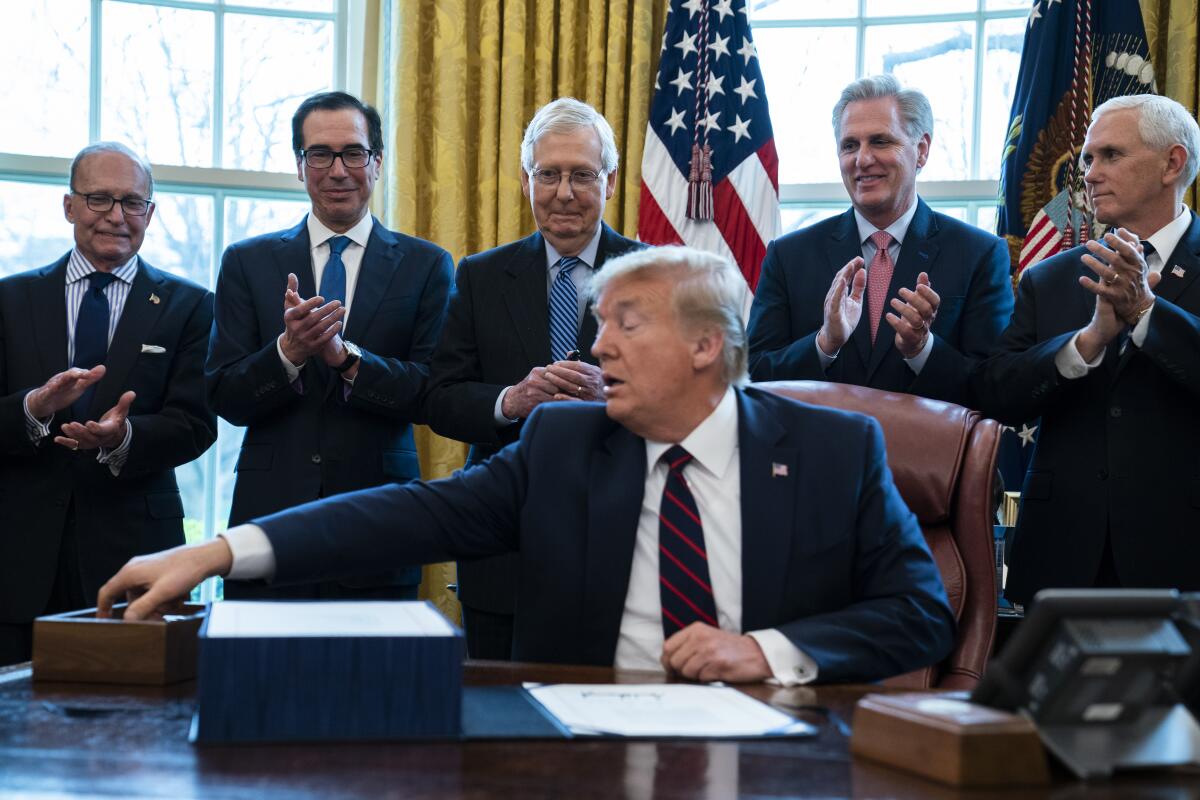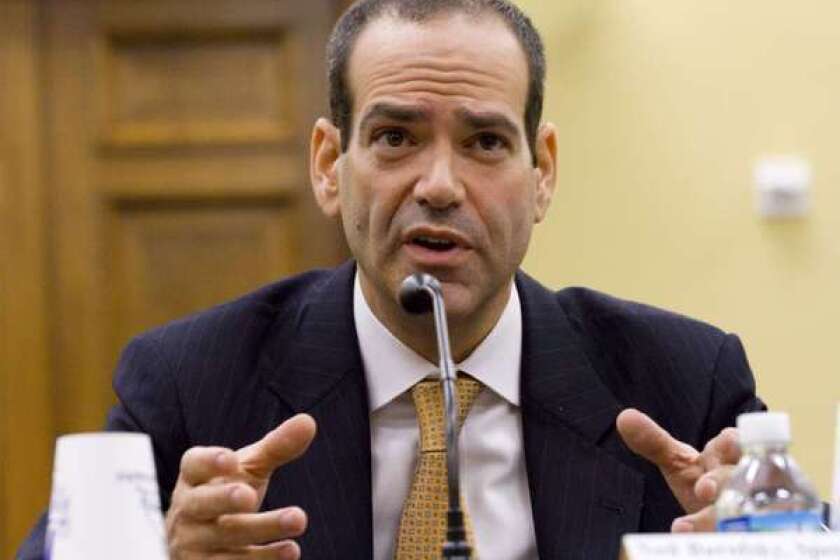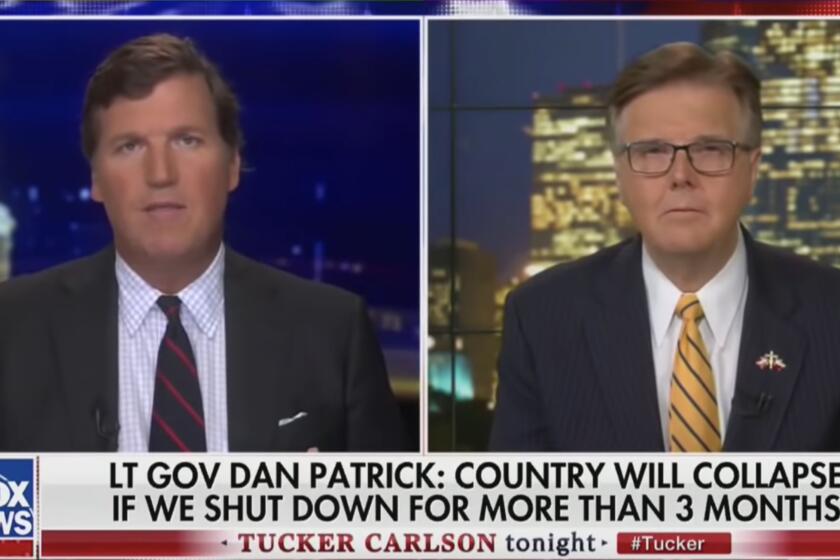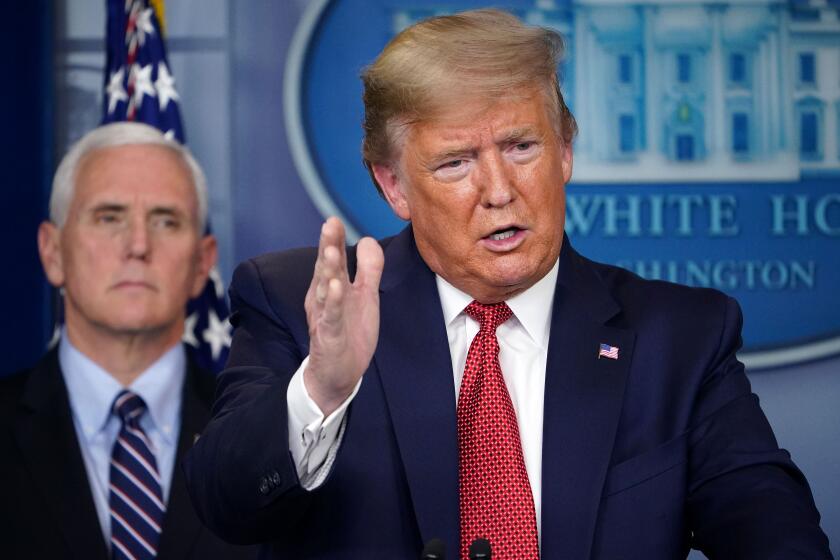Column: Trump blocks coronavirus bailout oversight even before it can start

- Share via
Even faster than Congress came together to pass its $2-trillion coronavirus bailout bill, President Trump signaled his intention to interfere with one of its most important provisions — public oversight of how the money gets doled out to big business.
In signing the bill late Friday, Trump stated that he considered several oversight provisions of the bill to exceed congressional authority — in fact, to represent “impermissible...congressional aggrandizement.”
They include provisions requiring that the chief bailout overseer, the special inspector general for pandemic recovery, or SIGPR, inform Congress “without delay” if executive branch departments “unreasonably” refuse the overseer’s request for information.
With $2 trillion in federal spending, oversight is not an elective; it’s an imperative.
— Rep. Katie Porter, D-Irvine
“My administration,” Trump wrote in a signing statement issued after he ceremonially signed the bill, “will not treat ... this provision as permitting the SIGPR to issue reports to the Congress” without presidential approval.
Trump’s statement thus signals that he’ll feel free to order executive branch departments not to cooperate with the inspector general.
Looking ahead, that could set up a new round of conflicts between Congress and the White House over lawmakers’ demands for information, similar to the conflicts that arose over their demands for information relevant to the impeachment inquiry.
Congress is about to make huge mistakes with the next bailout, says a veteran of the last bailout
This raises the question, even before the first dollar is spent on the $500-billion business bailout in the measure, of what Trump expects to need hiding.
Most important, it undermines a crucial element of the bailout. As we’ve reported, congressional and public oversight of the spending is necessary to make sure that the bailout serves its purposes. “If you’re going to distribute the money without conditions attached ... your policy goals are not going to be achieved,” Neil M. Barofsky, who oversaw the spending from the 2008 bank bailout, told me.
The bill that emerged from Congress and that Trump signed seemed to avoid that pitfall. But with the stroke of a pen, Trump opened the way to finagling, waste and grifting.
Borofsky called Trump’s statement “potentially problematic.”
The oversight language in the virus bailout bill was the same as in the legislation that established his office, which oversaw spending from the Troubled Asset Relief Program, or TARP, the 2008 bank bailout.
That language “was an important tool to have when parts of the administration [were] uncooperative, ‘ Borofsky told me Monday by email. “Just having that tool, and the threat of going to Congress, was very valuable in my experience, and losing it could impede the ability of the IG to the information it needs to full its mandate under the statute.”
The oversight provisions to which Trump objects include requirements that he consult with Congress on appointing the SIGPR and staff members of the oversight office, and language giving Congress a role in bailout spending made through the Department of Veterans Affairs, the U.S. Agency for International Development and the State Department.
Starting with President Trump, the GOP is calling to put millions at risk of contracting coronavirusso the stock market recovers.
Borofsky acknowledged that Trump might just be rattling his saber at Congress, rather than telegraphing an uncooperative stance against providing information. The signing statement “might be an expression of philosophy of the authority of the executive branch to oversee all communications with Congress, with little practical impact,” he said. “Time will tell.”
Trump said that any requirement that he consult with Congress on staffing violates the Constitution. “My Administration will treat this provision as hortatory but not mandatory,” his signing statement says.
Trump’s assertion that he can overturn the oversight rules also underscores how untrustworthy he is as a negotiating partner. The bailout bill was crafted by Democratic leaders in Congress and Treasury Secretary Steven Mnuchin, a Trump appointee, and designed to ensure Trump’s signature.
Congressional oversight was a specific Democratic demand after an earlier Republican version vested Mnuchin with unilateral authority to disburse the business bailout funds, and even to keep the recipients secret for six months. That authority was eliminated in the final bill, replaced with the oversight provisions. The final bill also specifically bars Trump, his family or his businesses from receiving bailout funds, although a provision loosening the tax rules for real estate investors could conceivably benefit his real estate firm.
Within hours after Trump released his signing statement, Democrats voiced their objections.
“With $2 trillion in federal spending, oversight is not an elective; it’s an imperative,” Rep. Katie Porter (D-Irvine) tweeted.
Op-Ed: A virus is raging. The economy is in free fall. Why Trump’s approval rating is still going up
Trump benefits from the “rally-round-the-flag” effect and because of bipartisan efforts to respond to the COVID-19 pandemic.
More to Read
Inside the business of entertainment
The Wide Shot brings you news, analysis and insights on everything from streaming wars to production — and what it all means for the future.
You may occasionally receive promotional content from the Los Angeles Times.














